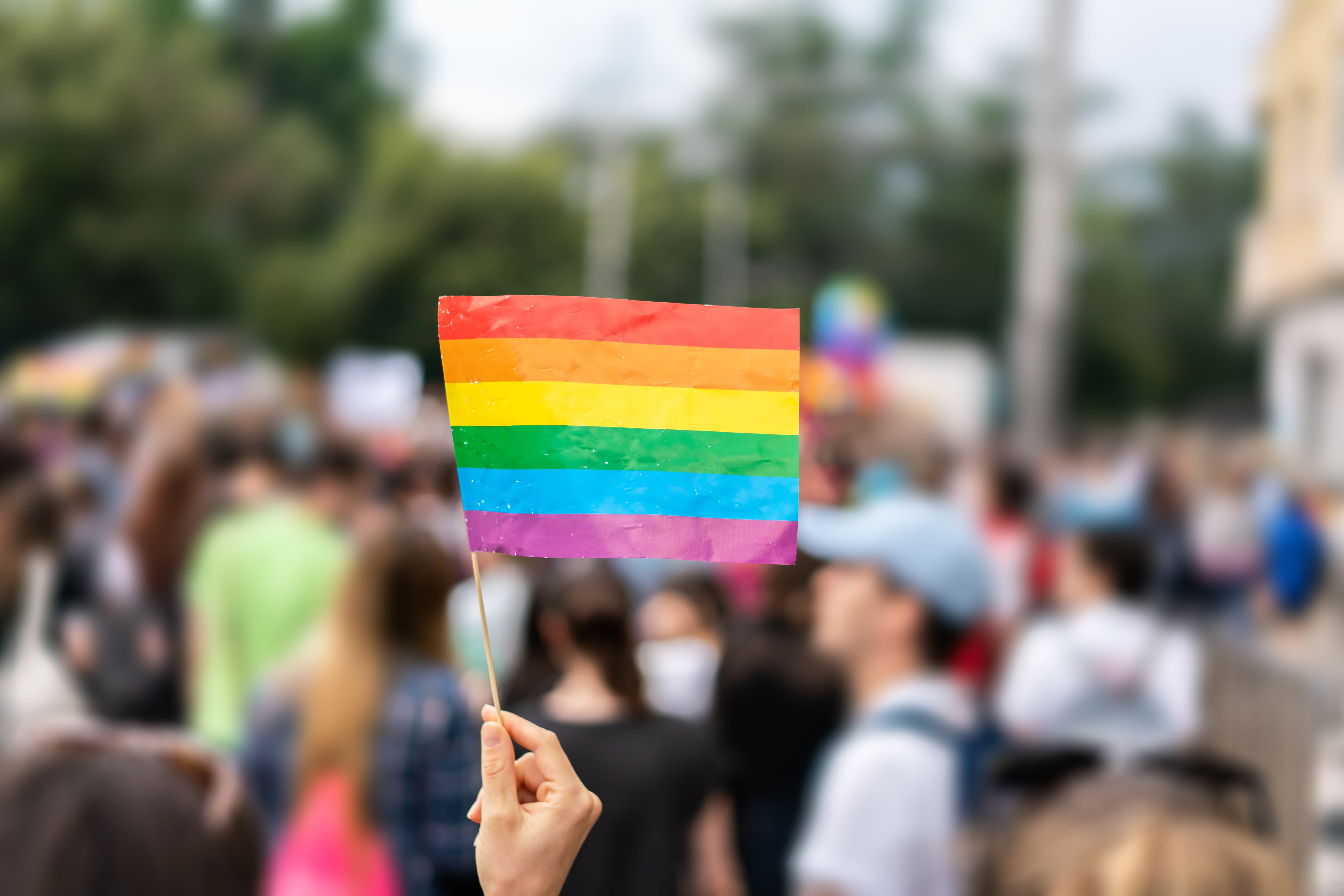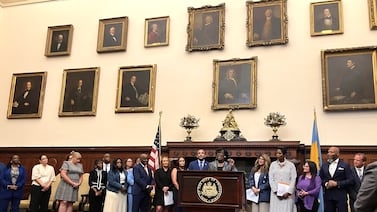Sign up for Chalkbeat Chicago’s free daily newsletter to keep up with the latest news on Chicago Public Schools.
In the last few months, Milo can’t help but notice how the mood among his fellow students at Chicago’s Jones College Prep has shifted.
What’s led to the change isn’t a development at the school itself, which is relatively friendly to queer and transgender students and where Milo, a senior, leads the Gay-Straight Alliance, or GSA. Instead, it’s how President Donald Trump’s administration and others have moved to restrict the rights of the LGBTQ+ community and transgender people in particular, including students.
In response, GSA clubs in Chicago Public Schools are mobilizing to support students as well as staff during a difficult and volatile period. The groups are emphasizing self-care and helping people understand the political and policy changes taking place. Students in them are also organizing public events and speaking out about curriculum, student behavior, and ensuring policy that affirms LGBTQ+ students is actually used in schools.
CPS currently has a robust set of guidelines for supporting trans and gender nonconforming students and staff. But ultimately, schools and other systems that serve students “need to make it clear that queer and trans kids are a priority to them and their support goes beyond just words” and don’t just treat them like “talking points,” said Milo. (Chalkbeat is using first names for Milo and other students in this story to protect their privacy and safety.)
“When members of our community are being targeted, that ripple is felt throughout the entire community,” Milo said. Chalkbeat is only using students’ first names for safety and privacy reasons.
In his first day in office, Trump signed a flurry of executive orders, including one declaring that the federal government would only recognize two sexes, male and female. The U.S. Department of Education has also tossed out protections for gender identity in schools adopted by the Biden administration and told educators they must share information about students’ gender identity with parents.
Before too long, Chicago and the state felt the effects of these dramatic policy shifts. In early March, two conservative groups filed a federal civil rights complaint against the Illinois State Board of Education and Chicago Public Schools, targeting the extension of Title IX policies to include gender identity. The federal Education Department promptly opened an investigation.
On Thursday, the department told states that in 10 days, they must certify that their schools aren’t engaging in what the Trump administration believes are illegal efforts to promote diversity, equity, and inclusion. States that don’t comply will lose their federal education funding, the administration said.
There is movement afoot to bolster current policies focused on supporting students like Milo.
A tentative contract agreement between the Chicago Teachers Union and the district announced earlier this week includes a commitment to having one staff person in each of the district’s 18 geographic networks provide support to GSAs and LGBTQ+ students, staff, and families. It also allows for schools to have a staff member volunteer to serve as a “Gender Support Coordinator.”
Corey Lascano, a CPS teacher and GSA advisor, said she expected conservative groups to leverage the Trump administration’s revisions to Title IX policies to target LGBTQ+-affirming policies in districts like CPS, which is why these new provisions are important.
Lascano said a lot of her conversations with students have focused on protecting themselves, both now and in the future.
“I had a conversation just today with a student regarding where they are going to college and what safety looks like for them in a state like Florida or Texas,” Lascano said. “To some degree, they can’t fully be themselves without getting pushback.”
That kind of support and counseling from teachers means a lot to students like Maggie, a Kenwood Academy student and GSA member.
In the wake of the 2024 election, Maggie said more teachers began being vocal about their support for LGBTQ+ students and posting signs with slogans such as “Trans Rights Are Human Rights.”
“Sometimes it can be really hard as a queer student to know what teachers to trust,” they said, “so being able to have teachers who are very vocal is important.”
School staff play important role for LGBTQ+ students
Some state and local education leaders have made it clear that Trump administration policy does not match theirs.
In February, Illinois Superintendent Tony Sanders publicly reaffirmed the state’s commitment to teaching the contributions of LGBTQ+ Americans throughout history in accordance with the state’s Inclusive Curriculum Law.
Sanders’ letter came in response to a letter from the federal Education Department advising educators that their schools were at risk of losing federal funding if they continued with diversity initiatives.
But that’s not necessarily enough for teachers like Lascano. She said CPS needs to stand firm in its stance to stand with LGBTQ+ educators and communities by enforcing the state law about inclusive curricula, not just highlighting it.
“You can have the most inclusive curriculum in the world, but [it doesn’t mean anything] if your principal is telling staff members they don’t need to teach any of the lessons with a trans character in it because it would violate their right to believe in only two genders,” Lascano said.
Milo said he’s taking a course called Gender and Sexuality in History, but wants to see LGBTQ+ histories and experiences integrated more into standard courses.
“Students shouldn’t have to choose an elective to learn their own history,” he said.
There’s a similar dynamic about how students and staff act and the resources available to them.
Julio Flores, program director for the Illinois Safe Schools Alliance, an organization that advocates families with LGBTQ+ youth experiencing challenges at schools, said he has received several requests from schools seeking professional development to be proactively supportive.
“Some young people are not wanting to use they/them pronouns for a nonbinary person because they think the executive order says they don’t have to,” said Flores, referring to Trump’s directive.
There’s been a rise in students’ casual use of homophobic, transphobic, and ableist language, said Julie Merrell, Kenwood’s GSA adviser. They noted that the increase they have observed has been incremental.
“It’s not like one day it was amazing and now it’s bad,” they said. “Students have dealt with being misgendered and deadnamed and made to feel like they can’t be themselves my entire teaching career.”
As an out nonbinary educator, Merrell said they are misgendered constantly by colleagues, including support staff members.
“I think that cis allies really need to show up by calling each other in and educating each other, so the work isn’t always on trans students and staff who are feeling increased anxiety at this moment,” Merrell said.
In addition to districtwide resources for reporting Title IX violations, Kenwood has an anonymous reporting system where students can report incidents — including allegations of homophobia or transphobia — to the principal.
“I don’t know how seriously the staff take it, but students don’t seem to take it seriously or trust it,” Maggie said.
There are other issues that official policy doesn’t always capture. Merrell said there are challenges to implementing student gender support plans when staff or administrative capacity is an issue. And community resources are not always equally accessible, Lascano noted.
“The North Side has very strong support and coalitions and organizing, but on the South Side and the West Side, community resources are more limited,” she said. “We need parents who are actively supporting queer and trans teachers, actively supporting their schools’ GSAs.”
Still, Lascano hopes that official moves like the language focused on LGBTQ+ students in the preliminary CTU contract — which she helped to write as part of a committee — represents progress.
“It ensures another layer of safety not just for queer and trans staff but for students as well,” she said.
In March, the CPS Office of Student Health and Wellness hosted an event called the Galaxy Summit that was a gathering “to learn about and celebrate the galaxies of gender, sexuality, and love” open to all students in 5th through 12th grade across the city, which teacher and GSA advisor Lindsey Williston brought students from her school to attend.
“They know it’s a bigger world, but to see it all in one room gives them comfort,” Williston said.
That’s the kind of community building that gives Milo hope.
“In a big city like Chicago, these connections are all around us and send a really strong message of support to people who might not be able to find that themselves,” Milo said.
Students say what they need from the adults in their school communities is quite simple: believe them.
“We know who we are,” said Maggie from Kenwood. “If we say ‘I think I’m trans’ or ‘I think I’m gay’ or ‘I think I’m bi,’ we mean it, and we deserve to be heard.”







